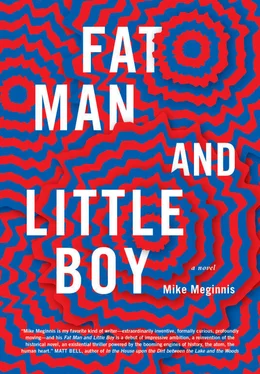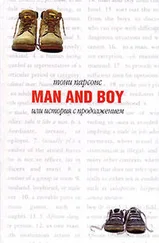Little Boy nods.
“Of course if she begins to look too authentic we shall have to leave. We’ve got a lot of ghosts to think about.”
“Albert won’t be joining us this morning,” says Francine.
What she means, thinks Fat Man, is that he’ll be with the police. Again. “I wonder why they don’t arrest him already. Or declare the matter concluded.” They speak French together, as they have taken to doing since he inserted himself in a domestic dispute between mister and missus. Little Boy moves food around his plate.
“Her husband won’t accept it was an accident,” says Francine. She joins them at the table, as she never does when Albert’s home. “Not that I blame him. And not that I think it excuses everything. But it was an accident, John.”
“I know. Man won’t even load his gun. Besides, those cops are twits.” He puts his hand like a fat pancake over her small, cool hand, which trembles and jerks beneath his. Not from romantic fervor, he knows, but perhaps because he disgusts her. Why not? His tits are bigger than hers.
She extracts her hand to hold the fork. Not without a certain glancing piquant eye contact as her flesh withdraws from his, nor without embarrassment at the moist suction applied by his skin. But women think they have to be tender.
He excuses himself to the bathroom. The waste runs like crude oil. His body is like a tarp draped over the emptiness it leaves. He feels numb and tired, the way it feels to bleed.
He watches himself wash his hands. His reflection looms in the mirror, swollen and hunched like a caterpillar worrying a leaf. The soap froth slicks him. He rinses and dries on his new gray wool sweater, leaving greasy-looking streaks on the breast and gut. He had hoped that fresh clothes would make him feel better, new again, alive. The folds at the corners of his eyes droop; they threaten to fall away like flower petals.
He squeezes his tits and pushes them together. He claws his cheeks until they are marked with red streaks the way his sweater’s streaked with damp.
“Not me,” he says to the mirror. “It wasn’t me.”
He says it until he believes.
When he comes back to the kitchen he sees Little Boy’s collar is askew. He straightens it and does the top button. Francine has left, her plate half-scraped into the garbage. It pains Fat Man to see such waste.
Everyone wants to know more about the Oriental spirit medium. She’ll come tonight, she’ll do a show, it will be at 7:30. This much is known. The rest is all rumor. She is said to wear many scarves and paper charms, but little else. She is said to be the most beautiful Oriental anyone has ever seen. She is said to be cursed or a genuine devil. They say during her last performance she made a table float several inches off the ground. They say she keeps a dead boy bound to her by his ankle, though no one can see or hear him. They say she talks to snakes. They say that everything talks to her—not only spirits, but rocks and trees, picture frames and pitchers, cookie jars and sugar bags.
Jacques relates all of this as he tells everything, as if it were a wild joke. He interrupts himself often to laugh. Fat Man smiles back at him—even when he tries, the boss doesn’t give him an opening to speak. He still assumes that Fat Man has no French, yet he does speak to him (natters, really, at the speed of a rock slide) as though he’ll understand. Jacques has taken to visiting him every day. Fat Man thinks it must be like visiting the zoo.
He is careful to work very hard when the owner comes calling. He uses his fingernails if he has to. They’re black underneath.
Jacques leaves laughing. Fat Man opens up a pack of cigarettes he keeps on a shelf beside the sink and lights one. He watches the smoke rise, imagining it’s a spirit, one that can talk to him.
He can’t imagine what a spirit would say. What can they want? They have nothing. What can they need? They are nothing.
Jacques comes back to the dishwashing station. Fat Man twists his cigarette against a dinner roll and throws it away. There are two men behind Jacques. The two police, short and thin. Mr. Bruce, Mr. Rousseau.
“Will you come down and have a talk with us?” says the short one, in English. “It’s in connection to your host, and the matter of a dead girl, among other things.”
“We’ve got you this time,” says the thin one.
They sit around a table in a room like a large closet. The walls are white bricks, and the white bricks pockmarked and cratered as if they’ve been nibbled. There is a bare, flickering light bulb hanging above them.
The short policeman, Mr. Bruce, has a coin-slot gap in his front teeth and glasses with thin, silver frames. Mr. Rousseau, the thin one, has long, greasy, clumpy sideburns like whiskers and a large pimple on the side of his nose. They examine Fat Man as if he were the bulging zit. They wear the faces worn by the soldiers and Japanese policemen tall and short.
“How are you doing, John?” asks the short one. “Are you well since last we met?”
This is his very subtle way of alluding to the fact they have met before, north of here, in another place, and perhaps implying he plans to develop their relationship; something like cowboys and Indians.
“Why are you here?” asks Fat Man. “Are you following me?”
“A pure coincidence,” says Mr. Rousseau.
“The purest,” says Mr. Bruce. “Of course we were interested to encounter you again, here, under such circumstances as these. So very much like the last time.”
“We wonder,” says Mr. Rousseau, stroking his left sideburn, “what you know about the murder.”
“The alleged murder,” says Mr. Bruce—an elaboration, not a correction. He merely enjoys the word.
“I understand the doctor made a mistake and the girl bled out. I guess she was a bleeder. I guess no one warned Albert, or the doctor, that she was.”
“Abortionist,” says Mr. Bruce. “We prefer to call him the abortionist, for the purposes of this case, since he was not practicing medicine at the time, but rather death.”
“You’ve brought Francine a lot of suffering by clinging to this tragedy like it was a crime,” says Fat Man. He wants his cigarettes. They are a new habit, but he can do nothing in half-measures. He wants a real big sandwich to eat while they talk at him, too, or a platter of cheeses. A tall, frosty mug.
“You know how they do an abortion?” says Mr. Rousseau. “They break the baby into chunks, and then the mother passes it out, usually into a toilet.” He gestures as if jiggling a handle.
Mr. Bruce says, “Imagine a sweet baby’s arm dangling from your bleeding snatch.”
Fat Man says maybe they should arrest the abortionist then.
Mr. Bruce raises his hand as if to strike him. But the hand rises slowly, and then it returns to the table. “We’ll deal with him. Why did you come here?”
“I wanted to start over,” says Fat Man.
“We mean here, as in now, this city.”
“I wanted work.”
“It wasn’t because of us?”
“Me and Mr. Rousseau,” says Mr. Bruce, touching himself where he keeps his heart, “we hope you weren’t fleeing any investigations.”
“It’s hard to get work with two cops following you everywhere you go.”
“Do you remember Laurel,” says Mr. Bruce, “from Paris?”
“This again?” says Fat Man.
“Do you remember Laurel?”
“I remember Laurel,” says Fat Man.
They had worked together in a Parisian bakery. She died in labor because she was so small. The child died as well. The police, on seeing Fat Man and Little Boy, assumed the hard, hateful expression of the Japanese soldiers and policemen, and then somehow connected her death to Fat Man, terrorized Little Boy in an interrogation room very much like this one, but ultimately came away empty-handed.
Читать дальше












